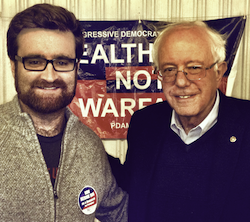
The labor federation’s rules don’t allow its state and local leaders to endorse presidential candidates, Richard Trumka says as the Vermont senator surges.
By Brian Mahoney
POLITICO Magazine
July 3, 2010 – Richard Trumka has a message for state and local AFL-CIO leaders tempted to endorse Bernie Sanders: Don’t.
In a memo this week to state, central and area divisions of the labor federation, and obtained by POLITICO, the AFL-CIO chief reminded the groups that its bylaws don’t permit them to “endorse a presidential candidate” or “introduce, consider, debate, or pass resolutions or statements that indicate a preference for one candidate over another.” Even “‘personal’ statements” of candidate preference are verboten, Trumka said.
The memo comes amid signs of a growing split between national union leaders — mindful of the fact that Clinton remains the undisputed favorite for the nomination — and local officials and rank and file, who are increasingly drawn to the Democratic Party’s growing progressive wing, for whom Sanders is the latest standard-bearer.
The South Carolina and Vermont AFL-CIOs have passed resolutions supporting Sanders, and some local AFL-CIO leaders in Iowa want to introduce a resolution at their August convention backing the independent senator from Vermont. More than a thousand labor supporters, including several local AFL-CIO-affiliated leaders, have signed on to “Labor for Bernie,” a group calling on national union leaders to give Sanders a shot at an endorsement.
The AFL-CIO’s constituent unions — as distinct from divisions of the federation itself — remain free to make endorsements however they wish. But they can’t make those endorsements acting through local and regional divisions of the AFL-CIO, as Trumka reminded everyone in the memo.
His message wasn’t anything new for the federation’s state leaders: They know that endorsement decisions belong to the national leadership. Still, it was unusual for Trumka to call them out in a memo. “I’m not sure I’ve ever seen one before like this,” said Jeff Johnson, the president of the AFL-CIO’s Washington state labor council.
Johnson agreed that it was important for the AFL-CIO to speak with a single voice. But “there’s a lot of anxiety out there in the labor movement,” he said, “and we’re desperately searching for a candidate that actually speaks to working-class values. The Elizabeth Warren/Bernie Sanders camp is very, very attractive to many of our members and to many of us as leaders, because they’re talking about the things that need to happen in this country.”
Similarly, Massachusetts AFL-CIO President Steven Tolman said he agreed that Trumka had to lay down the law. More tellingly, though, he added: “Bernie Sanders has spent his life actually fighting for working people. He’s made no secret of it, and he’s used it as his mantra. And that I respect very much.” When asked about Clinton’s candidacy, Tolman was less effusive: “Who? Who? Please. I mean with all respect, huh?”
Other state-level union leaders affiliated with the AFL-CIO didn’t bother to give Trumka and his memo lip service. “I was disappointed by it,” said UPTE-CWA Local 9119 organizing coordinator Lisa Kermish, of Berkeley, California. “I think that local unions and national unions, while it’s important to work together for strength, I think that this is in some ways truncating dialogue. And I find that very unfortunate.” (Continued)
Continue reading AFL-CIO Leader Tries to Quell pro-Sanders Revolt



